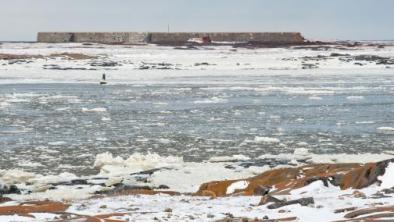Manitoba Provincial Park Logging Road Appealed
Tuesday, September 15, 2009

License issued to build road through caribou habitat in Grass River Provincial Park
Today, the Wilderness Committee, Canada's largest membership-based wilderness preservation organization, filed a formal appeal of the environmental license issued to build a logging road across Grass River Provincial Park in northwestern Manitoba, despite the fact that the Manitoba government only recently announced an end to logging activities in Provincial Parks throughout the province.
Tolko Industries applied to the Manitoba government in March 2008 for a license to build an all-weather logging road across Grass River Provincial Park. In June of 2009, the government passed legislation that banned logging in Grass River and three other provincial parks, yet in August the environmental license was issued for the construction of the Dickstone South Road, an all-weather logging road that will cut across the park. The primary question to be answered by the Conservation Minister in appeal is how a new logging road can be authorized for an area that logging is banned in.
Additionally, the government’s summary file—posted online with this license—shows that the government’s Parks branch as well as Northwest region Conservation oppose this road. It also shows that Water Stewardship recommendations were completely ignored and left out of the license. In the summary document, comments on woodland caribou—protected under federal and provincial endangered species laws—acknowledge very little data is available about woodland caribou in the area, there is no plan on how to care for this Threatened species, and that this project will affect them. Despite the acknowledged lack of information or plan, a provincial wildlife expert deemed the impact on caribou not serious enough to stop the project.
“The issuance of this environmental license was shocking, but we became outraged when we read the summary file,” said Eric Reder, Campaign Director for the Wilderness Committee’s Manitoba office. “Parks branch doesn’t want the road, local Conservation staff don’t want the road, and Water Stewardship staff don’t want the road. Our appeal asks why the government officers charged with managing this area of the province were not listened to, and what the justification is for putting woodland caribou at further risk.”
-30-
For more information please contact:
Eric Reder, Wilderness Committee (Manitoba) Campaign Director; (204) 997–8584; eric@wildernesscommittee.mb.ca
Today, the Wilderness Committee, Canada's largest membership-based wilderness preservation organization, filed a formal appeal of the environmental license issued to build a logging road across Grass River Provincial Park in northwestern Manitoba, despite the fact that the Manitoba government only recently announced an end to logging activities in Provincial Parks throughout the province.
Tolko Industries applied to the Manitoba government in March 2008 for a license to build an all-weather logging road across Grass River Provincial Park. In June of 2009, the government passed legislation that banned logging in Grass River and three other provincial parks, yet in August the environmental license was issued for the construction of the Dickstone South Road, an all-weather logging road that will cut across the park. The primary question to be answered by the Conservation Minister in appeal is how a new logging road can be authorized for an area that logging is banned in.
Additionally, the government’s summary file—posted online with this license—shows that the government’s Parks branch as well as Northwest region Conservation oppose this road. It also shows that Water Stewardship recommendations were completely ignored and left out of the license. In the summary document, comments on woodland caribou—protected under federal and provincial endangered species laws—acknowledge very little data is available about woodland caribou in the area, there is no plan on how to care for this Threatened species, and that this project will affect them. Despite the acknowledged lack of information or plan, a provincial wildlife expert deemed the impact on caribou not serious enough to stop the project.
“The issuance of this environmental license was shocking, but we became outraged when we read the summary file,” said Eric Reder, Campaign Director for the Wilderness Committee’s Manitoba office. “Parks branch doesn’t want the road, local Conservation staff don’t want the road, and Water Stewardship staff don’t want the road. Our appeal asks why the government officers charged with managing this area of the province were not listened to, and what the justification is for putting woodland caribou at further risk.”
-30-
For more information please contact:
Eric Reder, Wilderness Committee (Manitoba) Campaign Director; (204) 997–8584; eric@wildernesscommittee.mb.ca

